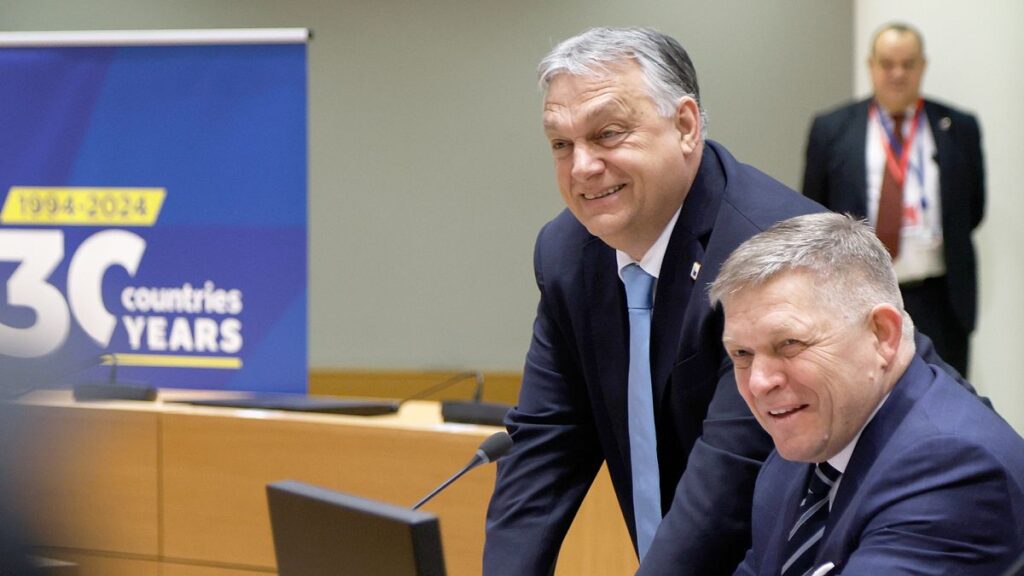Detention centers in third countries, fences and strict border controls have become the “new normal” in some countries on the continent in the name of providing more security to citizens.
Robert Fico, the populist Slovak Prime Minister, his Hungarian counterpart Viktor Orbán and Serbian President Aleksandar Vučić believe that, unlike their European colleagues, they have already implemented a formula to deal with migration.
Speaking at a mini summit in the Slovak town of Komárno on Tuesday, Prime Minister Fico gave his vision of what the EU could look like along the Bratislava-Budapest-Belgrade axis.
“We are talking about building camps in the migrants’ countries of origin or in safe third countries where migrants will be intercepted”said Robert Fico.
“We are talking about a better return policy, because of the 100% of illegal immigrants who arrive in Europe, 80% stay there and only 20% manage to return home.”
At the last European Council, some leaders of the 27 EU countries praised the model of outsourcing “hot spots” on the model launched by Italian Prime Minister Giorgia Meloni in Albania.
An impulse that Viktor Orban described as a “rebellion against migration” in a publication on X.
“The only way to solve the European migration crisis is to protect our borders and stop migration. That’s why we are here”.
“In 2023, it was decided to return 430,000 illegal migrants from EU countries, and only 84,000 have been returned so far”underlined the Hungarian Prime Minister.
In the name of trilateral anti-migration cooperation, Fico and Orbán, both heads of EU member states, offered full support to Vučić for Serbia’s membership in the bloc.
“We achieved results by working together, it was not easy, but this year there are 80% fewer migrants than last year. We will continue to work together, and I believe the results will be good “said Vučić.
“At present, there are only 477 migrants in the reception centers of the Republic of Serbia. We will of course continue to do our work in the interests of Europe and our friends, our brothers in Hungary and Slovakia.”
However, President Vučić clarified that “Serbia will never host migrant camps for other countries like Albania.”
What is the benefit for Belgrade?
While Slovakia and Hungary, as EU member states, could benefit from Serbia’s collaboration in stopping migrants at the borders, what are the benefits for Serbia?
For Oliver Röpke, the president of the European Economic and Social Committee, this will not necessarily advance the file of Serbia’s accession to the EU any faster.
“We cannot benefit from a fast track without meeting all the criteria. If some countries encourage enlargement more strongly than others, I must say that I will insist that this is not about “a superficial process. It must be a merit-based process that involves civil society.” Mr. Ropke explained.
“We have always been strong advocates of a common immigration policy and have always placed emphasis on legal immigration routes.”
“I think it’s important and we shouldn’t just focus on how we can deport so-called irregular migrants as quickly as possible, we really need to take a balanced approach,” he concluded.
This new trilateral format between the three countries seems to be developing while the Visegrad group (Hungary, Poland, Czech Republic and Slovakia) suffers from strong differences of views on the Ukrainian crisis.
Hungary, Slovakia and Serbia, on the other hand, share the same more flexible approach towards Russia, while Poland and the Czech Republic have folded into the pro-transatlantic and anti-Kremlin camp.
“The BBB (Bratislava, Budapest, Belgrade) format is an opportunistic forum for exchanging views between leaders politically close to each other. However, the BBB will never replace the Visegrad Group because its funds are still large” , said Slovak author and journalist Andrej Matisak to Euronews.
“For Serbia it is good to have two defenders (Hungary and Slovakia) within the EU when it comes to enlargement discussions”concluded Mr. Matisak.


